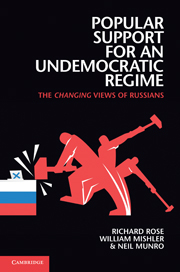Book contents
- Frontmatter
- Contents
- List of figures
- List of tables
- Introduction: The need for popular support
- 1 Democratic and undemocratic models of support
- 2 Changing the supply of regimes
- 3 Putin consolidates a new regime
- 4 Increasing support for an undemocratic regime
- 5 Individual influences on regime support
- 6 Time tells: there is no alternative
- 7 Finessing the challenge of succession
- 8 The challenge of economic reversal
- 9 Maintaining a regime – democratic or otherwise
- Appendix A New Russia Barometer samples
- Appendix B Coding of variables
- References
- Index
1 - Democratic and undemocratic models of support
Published online by Cambridge University Press: 05 June 2012
- Frontmatter
- Contents
- List of figures
- List of tables
- Introduction: The need for popular support
- 1 Democratic and undemocratic models of support
- 2 Changing the supply of regimes
- 3 Putin consolidates a new regime
- 4 Increasing support for an undemocratic regime
- 5 Individual influences on regime support
- 6 Time tells: there is no alternative
- 7 Finessing the challenge of succession
- 8 The challenge of economic reversal
- 9 Maintaining a regime – democratic or otherwise
- Appendix A New Russia Barometer samples
- Appendix B Coding of variables
- References
- Index
Summary
The concept of political support has been developed to answer a seemingly simple question: “How can any political system ever persist?” (Easton,1965: 15). This shifts attention from a static analysis of institutions to the dynamic interaction between government and the governed. In David Easton's (1965: 159ff.) classic theoretical framework, political support is about “citizens orienting themselves favorably toward the regime.” The lack of a favorable orientation toward the regime need not express endorsement of an alternative regime. Instead, it can reflect a lack of interest in politics or skepticism about whether the regime's performance will match its promises. Although these attitudes are not favorable, they are a second-best alternative, for people with no interest in politics or skeptical of whoever holds office are unlikely to be active opponents of the powers that be.
Compliance with core political laws is the behavioral manifestation of support. Whereas citizens want government to be responsive to their demands, governors want compliance with their demands. Core political laws are the “primary rules” that a regime uses to maintain its authority (Hart, 1961: ch. 5; Rose, 1969: 604ff.). Whether or not people approve core laws, there should be a high probability that the demands of governors will be obeyed by those whom they claim to govern (Weber, 1947: 152). What constitutes core political laws differs between cultures and context. In a theocratic Islamic regime a woman appearing in public with her head uncovered or face unveiled may be deemed to violate a core political law.
- Type
- Chapter
- Information
- Popular Support for an Undemocratic RegimeThe Changing Views of Russians, pp. 11 - 26Publisher: Cambridge University PressPrint publication year: 2011

